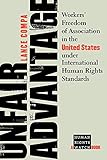Unfair Advantage : Workers' Freedom of Association in the United States under International Human Rights Standards / Lance Compa.
Material type: TextSeries: A Human Rights Watch BookPublisher: Ithaca, NY : Cornell University Press, [2018]Copyright date: ©2004Description: 1 online resource (264 p.)Content type:
TextSeries: A Human Rights Watch BookPublisher: Ithaca, NY : Cornell University Press, [2018]Copyright date: ©2004Description: 1 online resource (264 p.)Content type: - 9780801489648
- 9781501722639
- 344.7301/892 22
- online - DeGruyter
- Issued also in print.
| Item type | Current library | Call number | URL | Status | Notes | Barcode | |
|---|---|---|---|---|---|---|---|
 eBook
eBook
|
Biblioteca "Angelicum" Pont. Univ. S.Tommaso d'Aquino Nuvola online | online - DeGruyter (Browse shelf(Opens below)) | Online access | Not for loan (Accesso limitato) | Accesso per gli utenti autorizzati / Access for authorized users | (dgr)9781501722639 |
Frontmatter -- CONTENTS -- ACKNOWLEDGMENTS -- INTRODUCTION, 2004 -- NOTE ON METHODOLOGY -- I. SUMMARY -- II. FINDINGS AND RECOMMENDATIONS -- III. WORKERS' FREEDOM OF ASSOCIATION UNDER INTERNATIONAL HUMAN RIGHTS LAW -- IV. FREEDOM OF ASSOCIATION UNDER U.S. LABOR LAW -- V. CASE STUDIES OF VIOLATIONS OFWORKERS' FREEDOM OF ASSOCIATION -- VI. LEGAL OBSTACLES TO U.S. WORKERS' EXERCISE OF FREEDOM OF ASSOCIATION -- CONCLUSION, 2004 -- HUMAN RIGHTS WATCH
restricted access online access with authorization star
http://purl.org/coar/access_right/c_16ec
We are not shy about reporting human rights abuses around the globe. We are much more reluctant to recognize them at home. This book exposes the violations of human rights witnessed daily in workplaces across our country. Based on detailed case studies in a variety of sectors, it reveals an "unfair advantage" in U.S. law and practice that allows employers to fire or otherwise punish thousands of workers as they seek to exercise their rights of association and to exclude millions more from laws that protect their rights to bargain and to organize. Unfair Advantage approaches workers' use of organizing, collective bargaining, and strikes as an exercise of basic rights where workers are autonomous actors, not objects of unions' or employers' institutional interests. Both historical experience and a review of current conditions around the world indicate that strong, independent, democratic trade unions are vital for societies where human rights are respected. In Lance Compa's view, human rights cannot flourish where workers' rights are not enforced. While researching workers' exercise of these rights in different industries, occupations, and regions of the United States, Human Rights Watch found that freedom of association is under severe, often buckling pressure when workers in the United States try to exercise it. Cornell University Press is making this valuable report, originally published in August 2000, available again as a paperback with a new introduction and conclusion that bring the story up-to-date.
Issued also in print.
Mode of access: Internet via World Wide Web.
In English.
Description based on online resource; title from PDF title page (publisher's Web site, viewed 02. Mrz 2022)


